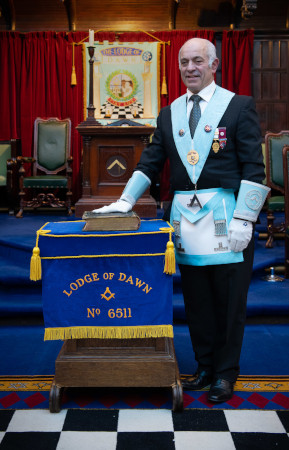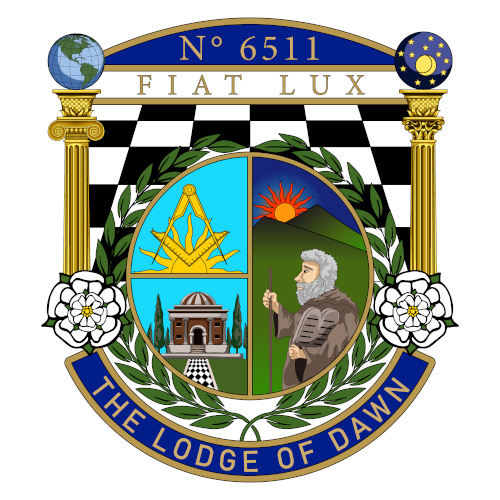We took some time out to talk to W Bro., Rob Phillips before he became Worshipful Master in 2020 about his thoughts about Freemasonry in general, and this, the Lodge of Dawn in particular.
 How did you get into Freemasonry?
How did you get into Freemasonry?
Although my father was a Freemason for over 50 years in Ireland, he never encouraged me to join, perhaps because I moved to the UK. It was actually my dentist who used to ask me about joining at the conclusion of every treatment. After 7 or 8 years of me saying, “I will but I’m really busy in my life at the minute” he changed his tack and at my next visit, he asked me whilst he had filled my mouth with dentist’s equipment. He took my garbled words as a “yes”. The rest is history. In retrospect, I wish I had joined when he first asked me.
Different people get different thing out of Freemasonry. Some people enjoy the intellectual challenge of performing different pieces of ritual; some people enjoy the charity work. I have most enjoyed the camaraderie and have made some wonderful friends through Freemasonry. If ever a Mason has crises in his life, he should be able to relay on fellow Brothers to assist; for example if he is ill or there is a bereavement in his family.
I also enjoy the relief from the hectic life I live. Once a month (or if you choose to do a piece of ritual, once a week) I turn off my phone and all the day-to-day hassle of life and focus on something completely different. It is a type of stress relief. Someone once said to me “it’s like going to the pub with your mates but with a purpose”.
The amount of time that you put in is down to the individual. Some members only ever come to the formal monthly meeting and the odd social event. These are what I call ‘backbenchers’. If you are performing a piece of ritual then you are expected to come to practice for the three weeks preceding it in order to ensure that it will indeed be ‘alright on the night’. Newer members start with small pieces (maybe three or four lines) and over time take on larger pieces. One of the interesting things is that some people have a capacity to just look or hear something and then remember it. For me it’s a bit of a slog; as I say to people “I’m a slow learner” but it’s the challenge and certainly it’s getting easier. They say the brain is a muscle and it needs exercise. I have an appalling memory for learning things but I have to say that over the 14 years I have been in lodge my memory has improved significantly.
What I always say to people is never take on anything that puts you under pressure outside of Freemasonry. Life is full of enough pressures – This is for fun and enjoyment. There are people for who Masonry has almost take over their lives in just the same way that golf can do but the key to it is, you do as much or as little as you want. But, as with most things in life, the more you put into it the more you get out. To use the golf analogy, the more you play the lower your handicap (in theory….. !!).
I guess the closest analogy is being Captain to a golf club or Commodore of a yacht club. In Masonic terms as Master, or to give it the full title the Worshipful Master, leads all the ceremonies that take place in the Lodge. As Master of the Lodge I am invited to attend ceremonies at all of the other lodges in Leeds. This is is a great honour and is a fantastic experience and through which I have made many more friendships. In fairness being the Master of a Lodge is very time consuming but it’s a once in a lifetime experience and so my view is make the most of it and enjoy it. Being Master also allows me the opportunity to arrange the Lodge’s social calendar. This year we are visiting the Bradford Industrial Museum as well as holding a pre-Valentines Ball for our wives and partners, as well as friends and families who are non-Masons. In addition, I have arrange for 14 members on the Lodge to visit a Lodge in Dublin. As we are going for two days, we will have to fill most of our time with some ‘non-masonic business’!
Masonic charities are one of the biggest charities in this county and the world over. Most of the money raised is within Masonry. People give according to their means. At every meeting, we hold a raffle and the money goes either to a lodge’s chosen charity or to the provincial Masonic charity. Any Brother can propose a specific charity that is close to him.
The charities that are supported are large and small. Decisions as to where to spend the money depend on size. If it is a small amount, it is purely up the Lodge. If it is a larger amount an application can be made to the provincial charitable fund and if it is a really large project, an application can be made to the national charitable fund. Charities can be anything from cubs and scouts in need of new tents to medical equipment not funded by the NHS to support for deprived kids or adults. Whenever there are tragedies arising in the world, be it earthquakes, fires, famine or whatever, masonic charities will almost certainly be contributing.
You can also read our series of interviews with Past Masters from The Lodge of Dawn, our ‘Memories of a Freemason’ series, here.
If you are not a Freemason and would like to find out more read our Seven Reason to Join The Freemasons or our simple ‘What is Freemasonry?’ guide.
And if you would like to join The Lodge of Dawn in Leeds, please feel free to get in touch via our ‘Contact Us’ page.
